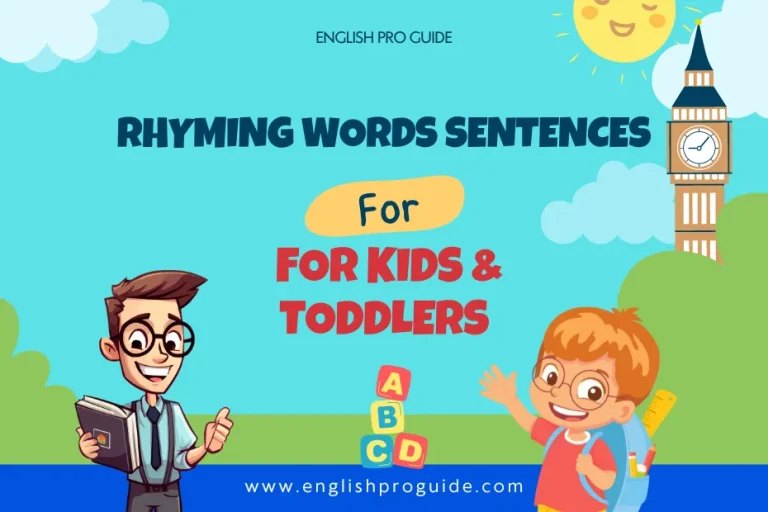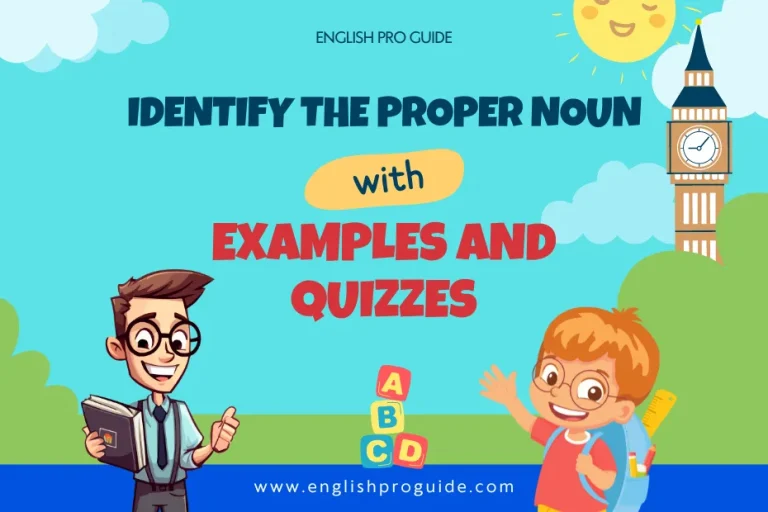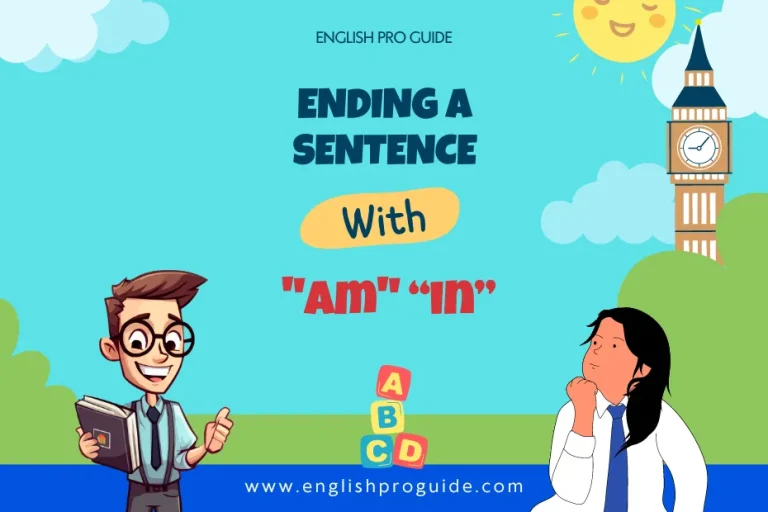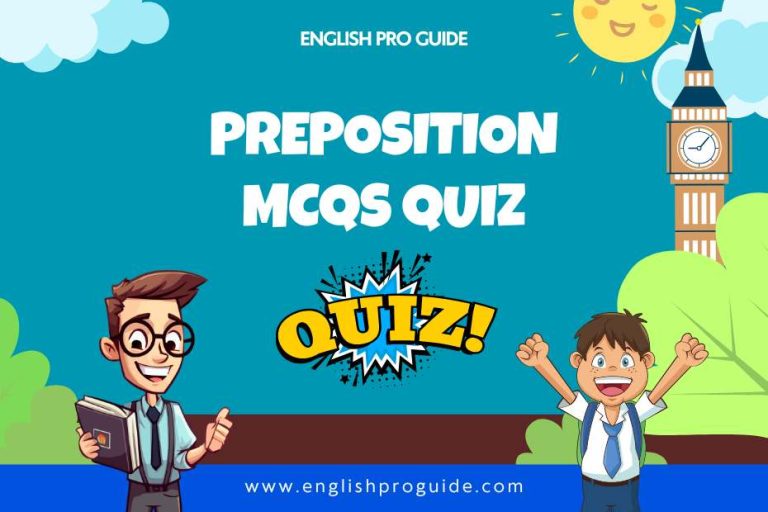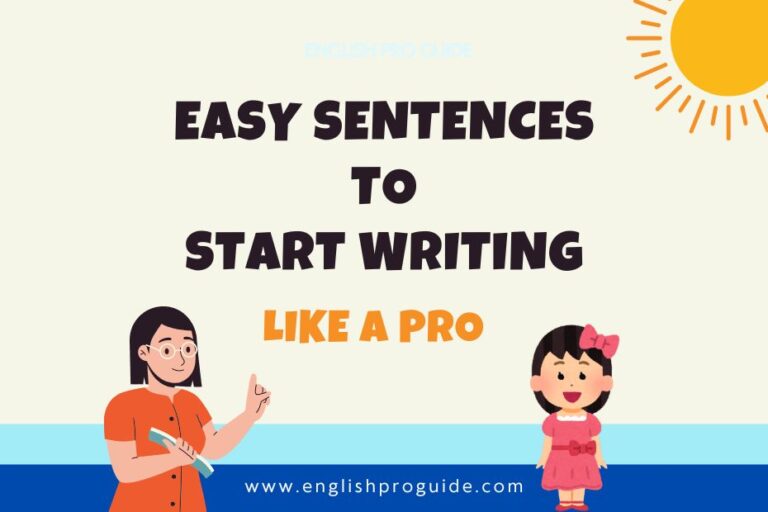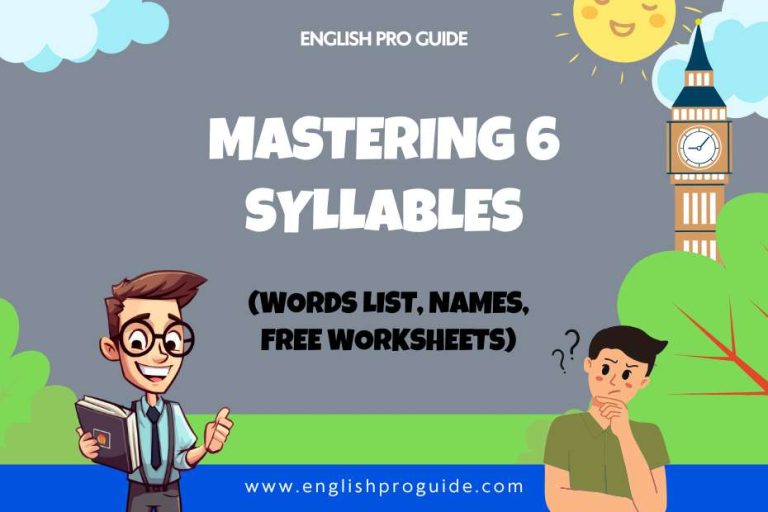What Are Verbs? | Simple Definition with Easy Examples
A verb is a word that shows an action, feeling, or state of being. In simple terms, a verb tells what someone or something does.
If you can do it—it’s probably a verb!
Examples: run, eat, think, sing, jump, is, are.
10 Clear Examples of Verbs in Sentences
- I run fast.
- She eats an apple.
- Birds fly in the sky.
- We sing together.
- He writes neatly.
- They play football.
- The baby cries loudly.
- You think too much.
- The dog barks at strangers.
- It is very cold today.
Tip: Ask your child or student, “What is the person or animal doing?” The answer is often the verb
Examples of Verbs in Action
What are verbs? Let’s look at some examples to make this crystal clear:
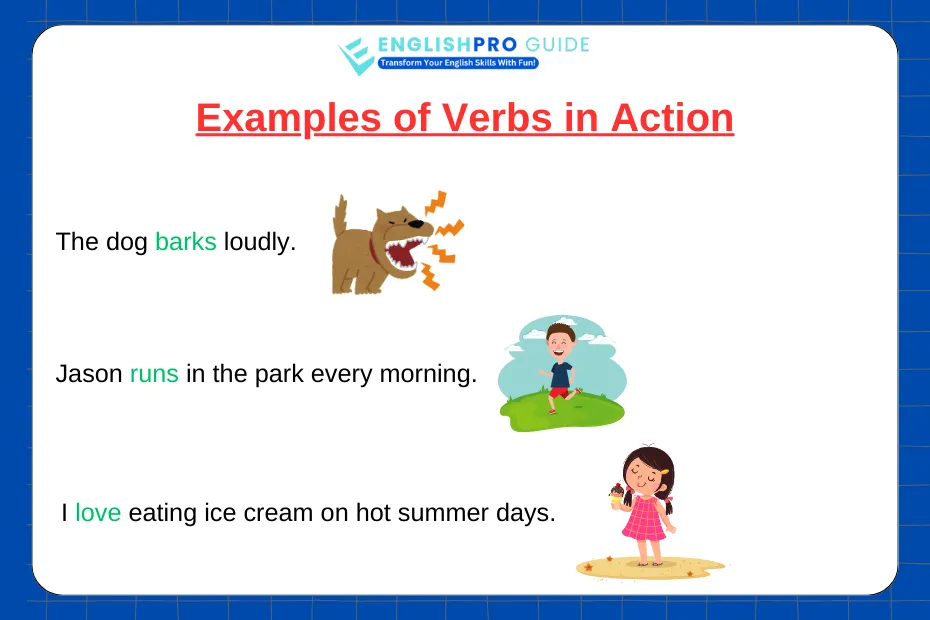
- “The dog barks loudly.”
- “Jason runs in the park every morning.”
- “I love eating ice cream on hot summer days.”
In each of these sentences, the verb (in bold) is doing the heavy lifting. It’s showing us the action or state of being.
Why Are Verbs So Essential for English Learners?
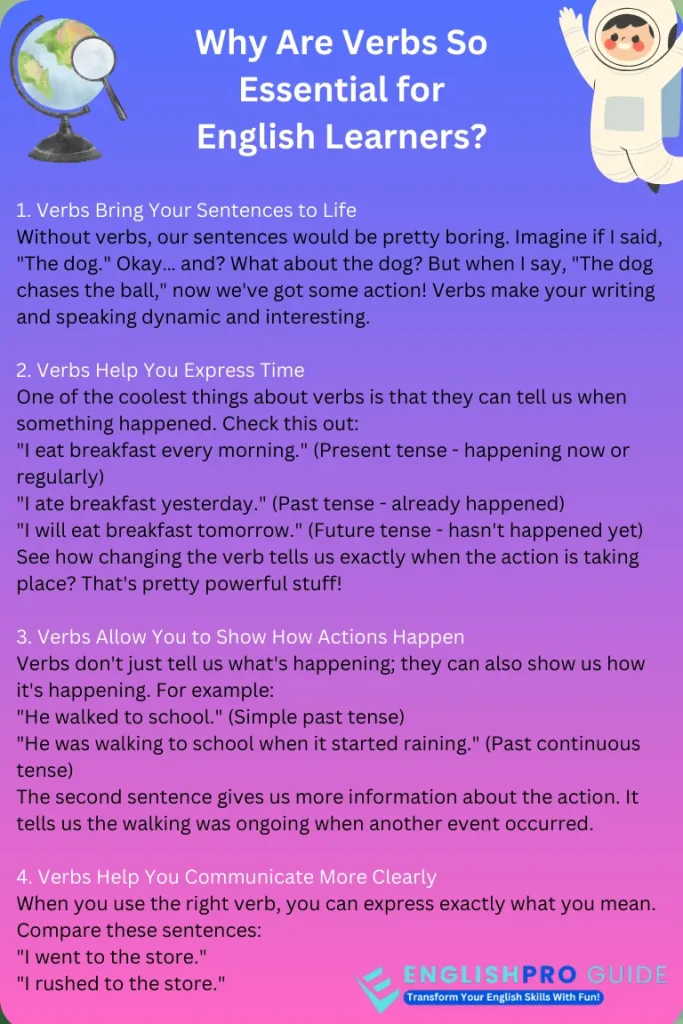
Now that we know what verbs are, let’s talk about why they’re such a big deal for anyone learning English. Trust me, understanding verbs is like having a superpower in the world of language!
1. Verbs Bring Your Sentences to Life
Without verbs, our sentences would be pretty boring. Imagine if I said, “The dog.” Okay… and? What about the dog? But when I say, “The dog chases the ball,” now we’ve got some action! Verbs make your writing and speaking dynamic and interesting.
2. Verbs Help You Express Time
One of the coolest things about verbs is that they can tell us when something happened. Check this out:
- “I eat breakfast every morning.” (Present tense – happening now or regularly)
- “I ate breakfast yesterday.” (Past tense – already happened)
- “I will eat breakfast tomorrow.” (Future tense – hasn’t happened yet)
See how changing the verb tells us exactly when the action is taking place? That’s pretty powerful stuff!
3. Verbs Allow You to Show How Actions Happen
Verbs don’t just tell us what’s happening; they can also show us how it’s happening. For example:
- “He walked to school.” (Simple past tense)
- “He was walking to school when it started raining.” (Past continuous tense)
The second sentence gives us more information about the action. It tells us the walking was ongoing when another event occurred.
4. Verbs Help You Communicate More Clearly
When you use the right verb, you can express exactly what you mean. Compare these sentences:
- “I went to the store.”
- “I rushed to the store.”
- “I strolled to the store.”
Each verb paints a different picture, doesn’t it? “Went” is neutral, “rushed” suggests hurry, and “strolled” implies a leisurely pace. Choosing the right verb makes your meaning crystal clear.
Read More: Fun Examples of Rhyming Words Sentences for Kids & Toddlers
Types of Verbs: The Different Flavors of Action Words
Just like ice cream comes in many flavors, verbs come in different types. Let’s explore some of the main categories:
Action Verbs: The Doers of the Sentence
Action verbs are probably what you think of first when you hear the word “verb.” They describe physical or mental actions that someone or something can do.
Examples:
- Run
- Jump
- Think
Try this: Look around you right now and name five things you can do. Those are all action verbs!
Linking Verbs: The Connectors
Linking verbs don’t show action. Instead, they link the subject of a sentence to more information about that subject. The most common linking verb is “to be” (am, is, are, was, were).
Examples:
- “The sky is blue.”
- “That cake smells delicious.”
- “I feel happy.”
Helping Verbs: The Sidekicks
Helping verbs (also called auxiliary verbs) work alongside main verbs to give more information about the action or state.
Examples:
- “I am reading a book.” (“am” helps “reading”)
- “She has finished her homework.” (“has” helps “finished”)
- “They will go to the movies tomorrow.” (“will” helps “go”)
State of Being Verbs: The Existers
These verbs describe a state of existence. The most common state of being verb is “to be” (am, is, are, was, were, etc.).
Examples:
- “I am a student.”
- “The flowers are beautiful.”
- “She was tired after the long day.”
The Building Blocks of Verbs: Infinitives, Participles, and Gerunds
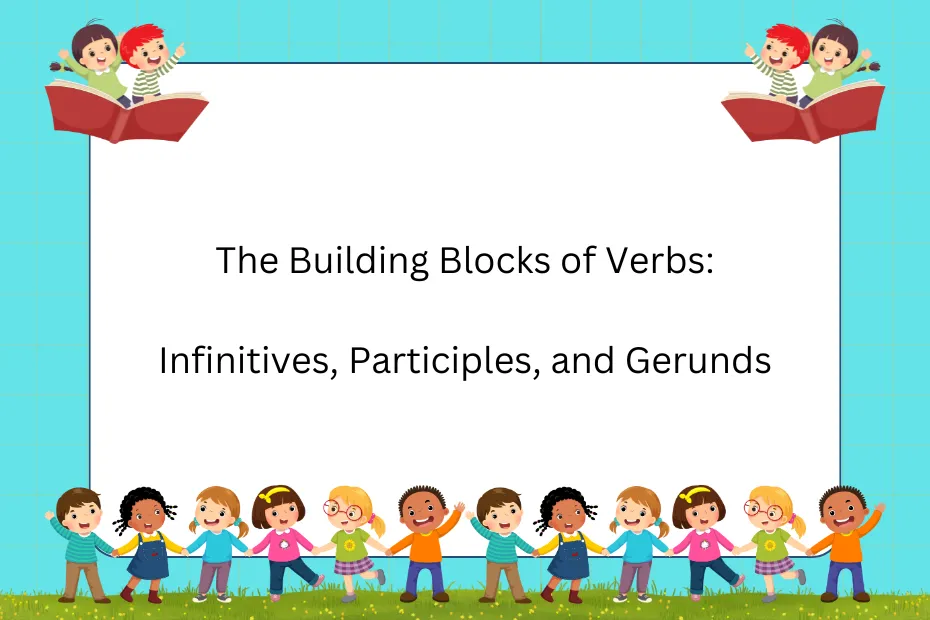
Now that we’ve covered the main types of verbs, let’s look at some special forms that verbs can take. These forms are like the secret ingredients that make English grammar so flexible and expressive.
Infinitives: The Base Form
An infinitive is the base form of a verb, usually preceded by “to.” It’s like the verb in its purest form, before it gets dressed up with tenses or other changes.
Examples:
- To run
- To sing
- To be
- To have
You might use infinitives like this:
- “I want to learn how to play the guitar.”
- “She loves to dance at parties.”
Participles: Verbs Playing Dress-Up
Participles are verb forms that can act like adjectives. There are two types:
- Present Participles (ending in -ing):
- “The running water sounded peaceful.”
- “I saw a smiling face in the crowd.”
- Past Participles (usually ending in -ed, -en, -t, or -n):
- “The broken toy made the child cry.”
- “We admired the written poem on the wall.”
Gerunds: Verbs Acting as Nouns
Gerunds are verb forms that end in -ing and function as nouns in a sentence. They’re like verbs in disguise!
Examples:
- “Swimming is my favorite sport.”
- “I enjoy reading books before bed.”
- “Cooking can be a relaxing activity.”
In each of these sentences, the gerund (in bold) is acting as the subject or object of the sentence, just like a noun would.
Read More: 500+ Examples Of Gerund, Infinitive And Participle
Verb Tenses: Traveling Through Time with Words
One of the most exciting things about verbs is their ability to show when something happens. This is done through verb tenses. Think of tenses as a time machine for your words!
Present Tense: What’s Happening Now
The present tense is used for actions happening now or things that are generally true.
Examples:
- “I eat breakfast every morning.”
- “The sun rises in the east.”
- “She is studying for her test right now.”
Past Tense: What Already Happened
The past tense is used for actions that have already happened.
Examples:
- “I ate breakfast yesterday.”
- “They visited Paris last summer.”
- “She was studying when I called her last night.”
Future Tense: What Will Happen
The future tense is used for actions that haven’t happened yet but will happen in the future.
Examples:
- “I will eat breakfast tomorrow.”
- “They are going to visit Paris next summer.”
- “She will be studying when you call her tonight.”
Perfect Tenses: Connecting Different Time Periods
Perfect tenses are a bit more complex, but they’re super useful for showing how actions in different time periods relate to each other.
Present Perfect
“I have eaten breakfast already.” (Past action with present relevance)
Past Perfect
“I had eaten breakfast before I went to school.” (Past action completed before another past action)
Future Perfect
“I will have eaten breakfast by the time you arrive.” (Future action that will be completed before another future action)
Verb Conjugation: Making Verbs Agree
Verb conjugation is how we change a verb to match its subject and tense. It’s like making sure your verb is wearing the right outfit for the occasion!
Let’s conjugate the verb “to sing” in the present tense:
- I sing
- You sing
- He/She/It sings
- We sing
- You (plural) sing
- They sing
Notice how the verb changes slightly when the subject is he, she, or it? That’s conjugation in action!
Irregular Verbs: The Rebels of the Verb World
Most verbs follow regular patterns when we change their tenses. For example:
- Play → Played → Played
- Walk → Walked → Walked
But some verbs like to break the rules. We call these irregular verbs. Here are some common ones:
- Go → Went → Gone
- Eat → Ate → Eaten
- Be → Was/Were → Been
Irregular verbs can be tricky, but with practice, you’ll get the hang of them!
Phrasal Verbs: When Verbs Team Up with Other Words
Phrasal verbs are special combinations of verbs and particles (usually prepositions) that create a new meaning. They’re like secret codes in English!
Examples:
- “Can you turn off the lights?” (turn off = switch off)
- “I need to look after my little sister.” (look after = take care of)
- “Let’s hang out this weekend.” (hang out = spend time together casually)
Phrasal verbs can be challenging because their meaning often isn’t obvious from the individual words. But they’re used all the time in everyday English, so learning them is super important!
Read More: 50 Examples of Ending a sentence with “am”
FAQ About Verb
What is a verb in simple words?
A verb is a word that shows what someone or something does. It can also show a feeling or a state of being.
What are 5 examples of verbs?
Jump, sing, is, read, play.
How do I find the verb in a sentence?
Ask, “What is happening in the sentence?” or “What is the subject doing?” The answer is usually the verb.
Are “is” and “are” verbs?
Yes! These are helping verbs or linking verbs that connect the subject to more information.
Final Tip
Verbs are the heart of every sentence. Without them, we wouldn’t know what anyone is doing!
Try this: Write your own 5 sentences using action verbs, and underline the verbs!
But don’t worry if it all seems a bit overwhelming right now. Learning a language is a journey, and every step you take brings you closer to fluency. The key is to keep practicing, stay curious, and have fun with it!
So, what’s your next move? Will you start a verb journal? Challenge your friends to a verb game? Or maybe you’ll pay extra attention to the verbs you hear and read in English?
Whatever you choose, remember that every verb you learn and use is a victory.

